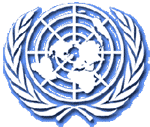
| UN Delays Indigenous Rights Declaration | 18 December 06 |
 In a move that stunned the international indigenous community, a number of African nations persuaded the majority of nation states to delay adoption of the United Nations Declaration on the Rights of Indigenous Peoples until September 2007. In a move that stunned the international indigenous community, a number of African nations persuaded the majority of nation states to delay adoption of the United Nations Declaration on the Rights of Indigenous Peoples until September 2007. Representatives of Namibia, Botswana and other African countries were disturbed the declaration lacked a definition of who is indigenous. The African countries were supported by New Zealand, Canada, Australia and the United States. The declaration has been in the works for 23 years and addresses individual and collective rights of indigenous people. It speaks to their rights to education, health, employment and language, outlaws discrimination and ensures indigenous people have the right to remain distinct. The newly formed UN Human Rights Council adopted the declaration June 29 in a vote of 30-2. Only Canada and Russia voted against it. Canadian Aboriginal leaders and all three federal opposition parties are accusing the Conservative government of harming Canada's reputation by reversing its position on the declaration. Assembly of First Nations Regional Chief Shawn Atleo said, "Canada was positioned to play a significant role in supporting the declaration but chose to actively oppose both as a member of the Human Rights Council and at the General Assembly." In a detailed explanation posted on the Indian Affairs website, department officials argue that such wording is so broad that it could lead courts to reopen land claims that have already been negotiated and settled. View December 12, 2006 UN News Centre View the December 12, 2006 CBC View the December 8, 2006 Indian Country Today View the December 3, 2006 Inter Press Service News Agency View the November 16, 2006 Globe and Mail article (DOC) View Canada's Position: United Nations Draft Declaration on the Rights of Indigenous Peoples Sources: UN News Centre, CBC, Indian Country Today, Globe and Mail
|
|
